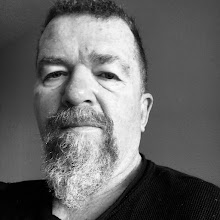Impractical Yet Indispensible
Practically speaking, I really have no justifiable reason to be doing this. Spending several weeks, that is, crafting a large-format box camera from foamcore, wood, salvaged optics and other bits and pieces, fashioning it into a workable camera that functions to project a focused image onto a paper negative; lugging said box camera along the rugged foothills of the Sandia Mountains, backpack filled with large-format sheet film holders, light meter, timer, darkcloth and other miscellany; heavy tripod over one shoulder, bulky box camera under the opposite arm; no way to catch myself, should I slip on the hard-packed sandy trail, except drop the tripod or camera first.
This is crazy. I have a Lumix G1, micro-4/3 format digital camera, equipped with a state-of-the-art, software-corrected lens, sitting on my office table at home. It can out-resolve and out-perform anything that this primitive lens/paper negative contraption can offer. It has automatic everything, capturing images in virtually any lighting condition, from the brightest sun to the darkest room, handheld, no tripod required, and in vivid color; things that this crude box camera couldn't possibly do.
So what's the point? Why go to all this trouble for results that are so ... limited?
Earlier this afternoon, while waiting for some glued pieces of wood to cure, I went for a motorcycle ride. It was a beautiful, late-winter day, after the previous day's snowfall. New Mexico's weather can change dramatically in just a few hours or days, and today was no exception. People were out on their Sunday drives, or riding their bikes, or jogging. As if, finally, winter were over, enough to permit breaking away from the nest, stretching one's wings.
My bike is an older cruiser, mid-1990s, with coarse, clunky shifting and hard, primitive suspension. The brakes aren't that good; engine braking is required for a sudden stop. The carburetor has a manual choke, and starts rough on a cold day. You have to work at riding it. This isn't like taking the Grand Marquis out on the highway, sinking back in its leather upholstery, opening her up and letting the miles pass by in quiet, gentle, luxurious splendor.
While cruising up Tramway Blvd this afternoon, I passed an old Model T Ford, out for a Sunday spin. It reminds me a lot of my bike. Manual transmission, primitive suspension and brakes, finicky carburetor. You have to work at it; a Sunday drive is an adventure, an accomplishment.
Later this afternoon, after I had returned from my ride, I loaded up several sheet film holders with pre-flashed grade 2 photo paper, and packed the truck with box camera, tripod and backpack filled with stuff. I drove up to the foothills of the Sandias, parked, and lugged the gear across hiking and biking trails until I came to a vantage point permitting a view of Sandia Peak, and the nearby foothills. I could have brought the Lumix G1, smooth and easy like the Grand Marquis; but instead I brought the box camera, like driving the old bike, or Model T; working at it.
Later in the evening, after processing and scanning the negatives, I set up a still-life composition in my garage, lit by a dim work lamp, and exposed a few more images, once more pouring up chemicals in trays, standing in the red-limned darkroom watching the images come up in the magic solution. They're not great pictures, by any stretch of the imagination, but I worked at them, coming away with a sense of accomplishment. I think it's the process itself that satisfies me, knowing that, a century previous, people more skilled and daring than I lugged similar wooden box cameras across near-identical trails and exposed their fresh vision onto salted papers and glass-plate negatives. It feels like a continuum, a thread linking the past, through the present, into the future, this business of projecting optical images onto surfaces of silver gelatin emulsions.
We take for granted the magic that surrounds us. Like the magic of a little metal and plastic box that produces splendid images onto light-emitting electric view screens. I am reminded of Arthur C. Clarke's quip about any technology sufficiently advanced will be indistinguishable from magic. I think the reverse is also true: any technology sufficiently primitive, be it manual typewriter, fountain pen or paper negative box camera, will also be indistinguishable from magic, if for no other reason than the simplicity of the process belies the sophistication of the results. Like, how does it do that? How do you get such a cool image from an empty box and simple lens? Standing behind the large box camera perched atop its hefty tripod, gazing into the inverted image on the primitive view screen, watching the plane of sharpness drift in and out as I adjust focus, quietly pondering the magic that is light itself; I must not take this for granted, this magic that is indispensable to a full and satisfying life.

1 Comments:
Beautiful camera and lovely shots.
Post a Comment
<< Home